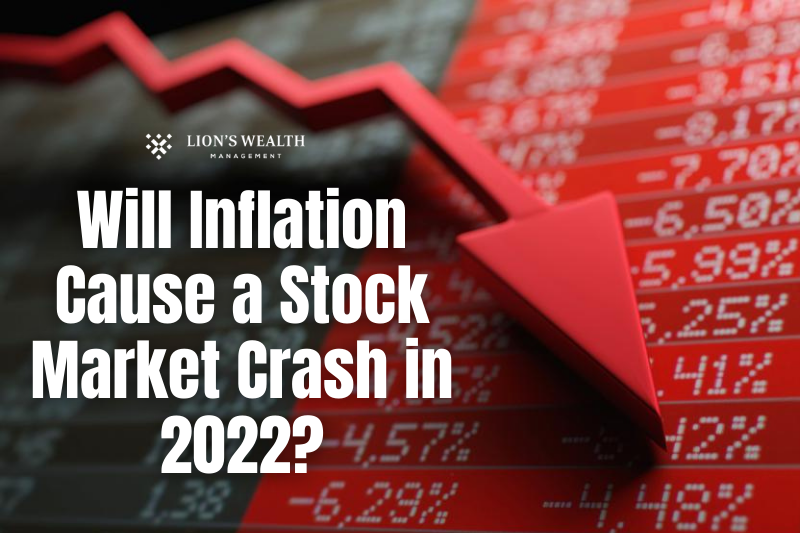
The beginning of 2022 has been a roller coaster ride for investors. Concerns about inflation and increasing interest rates led equities plunging in January, and Russia’s invasion of Ukraine in February spurred another round of market turbulence.
All of this dread and uncertainty about what’s next has fueled speculation about the possibility of another stock market crash—the first since the coronavirus epidemic began in 2020.
So, will the stock market tumble during the remainder of 2022? Let’s take a look at some of the important elements (with a calm, level mind) to get a clearer sense of where the market is headed.
What Exactly Is a Stock Market Crash?
A stock market crash is a sudden and significant decrease in the value of stocks caused by investors selling their shares immediately. This reduces the value of equities for other shareholders, who begin selling their shares to reduce their losses. As a result, people may lose a significant portion of their investment.
What Causes a Stock Market Crash?
A stock market collapse is driven by two factors: a sharp decline in stock values and widespread panic. This is how it works: Stocks are tiny shares of a corporation that are purchased by investors who profit as the value of their stock rises. The worth and price of such stocks are determined by how well investors feel the firm will perform. As a result, if they believe the firm in which they have invested is in trouble, they sell the shares in an attempt to get out before the value declines.
The truth is that panic plays just as big a part in a stock market meltdown as the underlying economic difficulties.
Let’s look at an example from the coronavirus epidemic to see how strong panic can be. As word of the illness spread, supermarket and convenience stores throughout the world ran out of toilet paper in just a few days. Was there a scarcity of toilet paper? In a nutshell, yes and no. There was plenty of it before people began to fear. However, when people went insane and began stockpiling toilet paper, their actions caused a scarcity!
A stock market meltdown can be precipitated by the same type of fear. When investors witness other investors selling off their stocks, they become quite concerned. The stock market then begins to fall in value, and more investors sell their shares. Then, suddenly, everyone is selling their stocks, and the market is in a full-fledged meltdown
Our point is that the stock market’s value is entirely reliant on perception and forecasting of the future. It’s no surprise that it feels like a roller-coaster ride!
What to Do in the Event of a Stock Market Crash
If the market crashes again in 2022, remember that you only lived through another crash a few years ago. In the midst of chaos, you must concentrate on what you can control: your attitude, viewpoint, and actions. Of course, a crash is terrifying. Yes, you will need to make some adjustments. However, with the correct strategy in place, you can and will continue to make progress.
Keep Calm During a Stock Market Crash
You must choose to be patient and consider long term in this situation. Whatever the remainder of 2022 has in store for you, keep reminding yourself of the things you know to be true. You are concerned about your family, your dreams, and your future, so make your investing selections accordingly. You’ll do a far better job of it if you stay optimistic and concentrate on the things you can control.
Consult with us
Schedule a call with a financial advisor when there are significant market moves. You need guidance tailored to your individual position, including your age, financial status, the sorts of retirement accounts you have, and which Baby Step you’re on. Don’t be frightened to express your thoughts. Make sure your spouse is on the line if you’re married! Make a strategy for how you and your partner will proceed.
The commentary presented herein contains the opinions of Lions Wealth Management, Inc., a State of Minnesota Registered Investment Advisor. This information should not be relied upon for tax purposes and is based upon sources believed to be reliable. No guarantee is made to the completeness or accuracy of this information. Lions Wealth Management, Inc. shall not be responsible for any trading decisions, damages, or other losses resulting from, or related to, the information, data, analyses or opinions contained herein or their use, which do not constitute investment advice, are provided as of the date written, are provided solely for informational purposes, and therefore are not an offer to buy or sell a security. Investments in securities are subject to investment risk, including possible loss of principal. Prices of securities may fluctuate from time to time and may even become valueless. This information has not been tailored to suit any individual.
